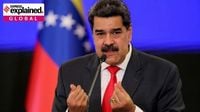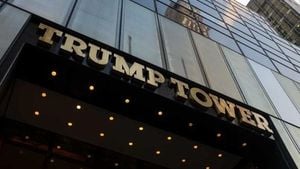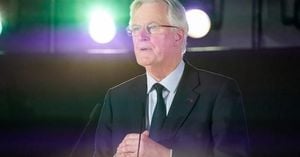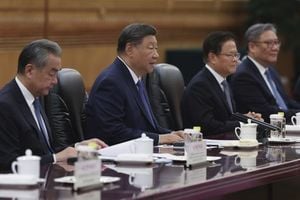In a dramatic escalation of tensions in the Caribbean, the United States has significantly increased its military presence off the coast of Venezuela, raising alarm bells about the possibility of regime change in the South American nation. Over the past week, the U.S. has deployed seven destroyers, multiple amphibious landing craft, and even a nuclear-powered attack submarine to the region, according to Reuters. Officials in Washington, led by Deputy White House chief of staff Stephen Miller, have publicly stated that the buildup is intended to "combat and dismantle drug trafficking organizations, criminal cartels and...foreign terrorist organizations in our hemisphere."
Yet, many experts and Venezuelan officials are skeptical of the official rationale. Retired Adm. James G. Stavridis, a former head of the Pentagon's Southern Command, told The New York Times that the deployment represents "operational overkill" and is not primarily about drug interdiction. "The massive naval flotilla off the coast of Venezuela…has little to do with actual drug interdiction — they represent operational overkill," Stavridis remarked. The majority of the seaborne drug trade, after all, moves through the Pacific, while most Caribbean traffic is airborne.
This skepticism is shared by David Smilde, a Venezuela expert at Tulane University, who described the move as "gunboat diplomacy." He told Reuters, "I think what they are trying to do is put maximum pressure…on the regime to see if they can get it to break." The fear in Caracas is palpable: many believe that the real aim is to force President Nicolás Maduro from power, by any means necessary.
The United States has a long and controversial history of intervening in Latin American affairs, often to install regimes friendly to its interests. The Monroe Doctrine, first articulated in 1823, established the Americas as Washington’s sphere of influence, while the Truman Doctrine of the post-World War II era sought to contain communism. As author Stephen Kinzer wrote in his book Overthrow: America’s Century of Regime Change from Hawaii to Iraq, "Throughout the twentieth century and into the beginning of the twenty-first, the United States repeatedly used its military power, and that of its clandestine services, to overthrow governments that refused to protect American interests...It cloaked its intervention in the rhetoric of national security and liberation. In most cases, however, it acted mainly for economic reasons — specifically, to establish, promote, and defend the right of Americans to do business around the world without interference."
Venezuela, with its vast oil reserves—the largest in the world—has long been a focal point for U.S. interest. Since the rise of anti-Washington socialist Hugo Chávez in 1999, the U.S. has struggled to exert control over the country’s lucrative oil sector. The 2002 coup attempt against Chávez, which ultimately failed, was widely seen as U.S.-backed. The pattern continued under Maduro, Chávez's successor and protégé.
In January 2019, then-President Donald Trump recognized opposition leader Juan Guaidó as Venezuela’s legitimate president, freezing Maduro’s assets and imposing sanctions on Venezuelan oil exports to the U.S.—a major blow to the country’s economy. Trump’s administration even held secret meetings with rebellious Venezuelan military officers ahead of the 2018 elections to discuss the possibility of a coup, according to The New York Times. The paper described these efforts as "one of Washington’s most overt attempts in decades to carry out regime change in Latin America."
After regaining the White House in January 2025, Trump wasted no time resuming his hardline stance. The White House has repeatedly labeled Maduro a "cartel leader" and a "fugitive of American justice." Draft legislation circulating in both the White House and on Capitol Hill would grant the president broad powers to wage war against drug cartels designated as terrorists, as well as against any country accused of harboring them, The New York Times reported. José Cárdenas, a former National Security Council and State Department official, told Newsweek, "It is a national security initiative meant to eliminate a source of tons of cocaine from entering the United States. Main Street, USA, can identify with that."
But oil remains at the heart of U.S. interests. Tom Shannon, a career diplomat and former undersecretary for political affairs, explained the logic to Newsweek: "Venezuela is sitting on the largest reserves of oil and gas in the world, and OFAC (Office of Foreign Assets Control), through its licensing process, gets to control who works in the oil and gas sector." After taking office in January, Trump sent special envoy Richard Grenell to Caracas to negotiate a license for Chevron to resume operations in Venezuela, seeking to edge out competitors from China and Russia—nations seen as hostile to U.S. interests.
The U.S. campaign has become increasingly public and aggressive. On September 27, 2025, the State Department released a video highlighting expanded U.S. naval patrols in the southern Caribbean and reaffirming a staggering $50 million reward for information leading to Maduro’s arrest—the largest bounty ever offered by Washington. Congressman Carlos A. Gimenez (FL-28) declared, "Maduro's days are numbered" after the video’s release. In a post on X earlier this month, Gimenez wrote, "Dictator Nicolás Maduro has declared war on the American people and his narco-terrorist regime must be crushed and eliminated once and for all."
The U.S. Navy and Coast Guard have ramped up operations across the Caribbean and Latin America, officially to disrupt transnational cartels. But Venezuelan officials have condemned these moves, framing them as part of a broader U.S. campaign to undermine Maduro’s government. Tensions escalated further after NBC News reported on September 26, 2025, that the U.S. is considering drone strikes against cartel targets inside Venezuela, potentially within weeks. The plans reportedly focus on targeting drug trafficking leadership and labs.
When pressed for comment, the White House pointed to a previous statement from President Trump: "We'll see what happens. Venezuela is sending us their gang members, their drug dealers and drugs. It's not acceptable." The administration has also reinforced its military presence in Puerto Rico and sent additional warships near Venezuela.
Maduro, for his part, is far from popular at home. Years of economic mismanagement, corruption, and allegations of human rights abuses have battered his reputation. Many independent watchdogs, both inside and outside Venezuela, agree that Maduro lost the 2024 elections but managed to cling to power through widespread rigging. While many Venezuelans want to see Maduro gone, there is deep unease about the prospect of U.S. intervention. The country’s history is littered with the fallout of foreign meddling, and the violence and instability that often follow. As one opposition politician told The New York Times, "And the cost for us Venezuelans, what will it be? What guarantee do we have that this (removal of Maduro) will translate into a recovery of our democracy?"
With the world’s eyes on the Caribbean, the stakes could hardly be higher. The coming weeks may determine whether the U.S. military buildup is a show of force, a prelude to intervention, or another chapter in the long, troubled saga of American involvement in Latin America.




